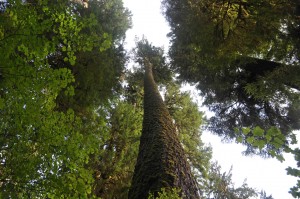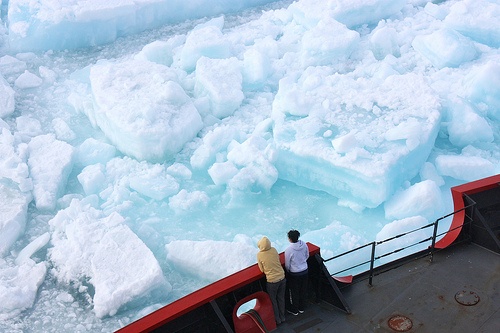By Carol Pierson Holding
New Year’s Day 2012 greeted us with headlines that a Shell oil drilling rig had run aground in the Gulf of Alaska. The gravest concerns were for personnel aboard the rig and tugs and the 150,000 gallons of diesel oil and 12,000 gallons of lubricant that the rig contained in its core.
As the top Democrat on the Natural Resources Committee, U.S. Rep. Ed Markey, D-Mass said that day, “Oil companies keep saying they can conquer the Arctic, but the Arctic keeps disagreeing with the oil companies.”
Shell had a different take. Posted after disaster was averted earlier this week, Shell announced on the home page of its web site that, “For hundreds of years, explorers have battled the Arctic. Today, we’re finally winning".
The question is, does Shell have any chance of winning?
The Shell oil rig Kulluk had been held in place with ropes tied to two tow ships until swells as high as 35 feet and winds gusting up to 70 miles an hour forced the crews to drag the vessel 10 miles so it could be grounded on the rocks of Sitkalidak Island.
[csrhubwidget company="Royal-Dutch-Shell" size="650x100" hash="c9c0f7"]
The Kulluk was being moved from Dutch Harbor, Alaska to Seattle for maintenance when the storm hit. And the problems started piling up:
- Engines on one tug failed because of poor fuel quality.
- A towline on another tow snapped because it didn’t have a proper release.
- A Coast Guard cutter attempted to secure the drifting oil rig but got the line wrapped around its propellers.
- The Kulluk, now unsecured, was pitching and rolling so violently that Shell asked the Coast Guard to airlift its personnel so safety. The Rescue efforts involved multiple cutters, ships and aircraft.
- The second tug was ordered to separate from the Kulluk for its own safety.
And on and on, day after day. As Thomas Ostebo, Commander, 17th District Coast Guard, said in a statement, “I applaud the efforts of all the vessels on scene and their courage in the face of almost impossible odds.”
Shell doesn’t seem to have anticipated even possible odds. According to a US government report, the beached Kulluk was built to withstand wave heights when disconnected (ie, not drilling) of 40 feet, assuming a storm duration of 24 hours. The storm currently trapping the rig has reached at least 35 feet and was wailing for at least four days.
This is crazy when you realize that this storm was far from the worst possible scenario. This was the fourth major storm this winter and it wasn’t even hurricane-strength. Just around the Kenai Peninsula in Anchorage, a weather station has measured wind speeds of up to 85 mph and higher.
Shell seems to have problems with every foray into Arctic drilling. As Fuel Fix reminds us:
“Other high-profile mishaps included the drifting of Shell’s contracted drillship Noble Discoverer near Dutch Harbor, Alaska last summer. Later, Shell’s first-of-its-kind spill containment barge was damaged during certification tests. Finally, weeks after drilling was done for the year, a fire broke out on the Discoverer’s rig stack, and safety and pollution-control system deficiencies were discovered on the ship in November.”
With the Kulluk, Shell is reminded that the worst environmental damage from oil spills happens while transporting the oil, as when the Exxon Valdez dumped 11 million gallons of oil in Prince William Sound, ironically not far from the current oil rig mishap.
Remember what caused the Valdez to fail? The captain was drunk.
Human errors can’t be anticipated. But Shell seems also to be sloppy, in matters both big and small. There is the lack of adequate margin in its vessel specifications. Then there’s the vessel’s name, Kulluk. Who would spend nearly $300 million to update a vessel and not change from a name that means “thumb” in Inuit…and “ashtray" in Turkish?
British Columbia is waking to the dangers of allowing oil to be transported so close to its shores. Native tribes, whose salmon rivers will be destroyed if the Kulluk leaks oil, were out in force. One has to wonder, how can Shell continue to claim victory in the face of such appalling failures? As Shell continues to pile insult on injury, our outrage grows.
Photo is courtesy of Alana Sise via Flickr CC
Carol Pierson Holding writes on environmental issues and social responsibility for policy and news publications, including the Carnegie Council's Policy Innovations, Harvard Business Review, San Francisco Chronicle, India Time, The Huffington Post and many other web sites. Her articles on corporate social responsibility can be found on CSRHub.com, a website that provides sustainability ratings data on 6,700 companies worldwide. Carol holds degrees from Smith College and Harvard University.
.
CSRHub provides access to corporate social responsibility and sustainability ratings and information on over 6,700 companies from 135 industries in 82 countries. Managers, researchers and activists use CSRHub to benchmark company performance, learn how stakeholders evaluate company CSR practices and seek ways to change the world.

